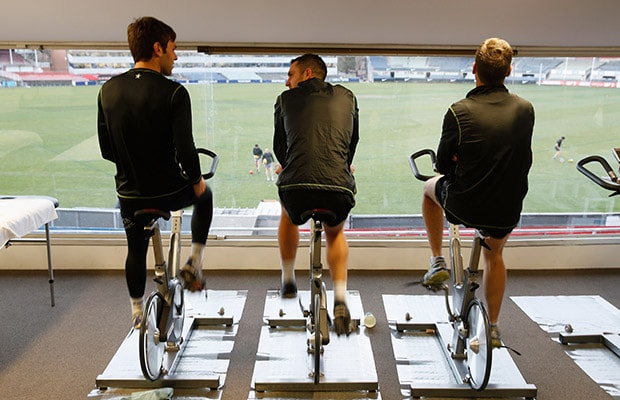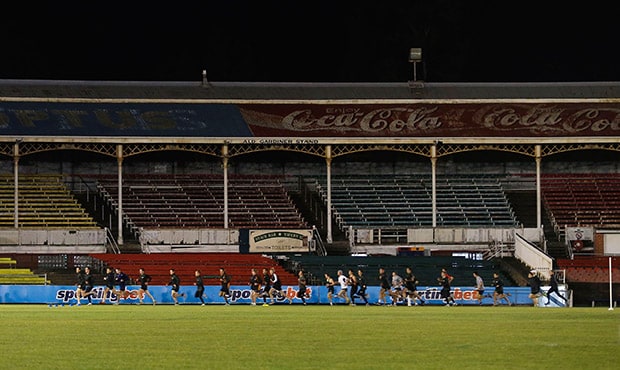• Part one: Match committee
HAYDEN Kennedy calls the meeting to order in a theatrette overlooking Visy Park, home of Carlton in Melbourne's inner northern suburbs. It sits above the old Hawthorn and Fitzroy rooms in what is still the Richard Pratt Stand in a facility the AFL umpires share with the Melbourne Rebels rugby union team.
Next door are the umpires' club rooms and they look like those you would see in any footy club around Australia, replete with honour boards, historical photos, notice boards and motivational messages.
In the hour before the 5.30pm meeting, the umpires come from work, get changed and head upstairs, exchanging tidbits from the weekend and from the sounds of the uproarious banter, presumably plenty of funny stories as well. Some have already been out on the ground practising their bouncing or in the case of the boundary umpires, attempting to throw the ball into a wheelie bin behind their backs.
Kennedy, the AFL umpires' coach, kicks off the meeting by welcoming some special guests – rising umpiring stars from various junior leagues around Melbourne who as part of the 'Mates' program receive mentoring from several of the AFL's most senior and decorated umpires.
On this occasion a special guest will be addressing the group – new AFL chief executive Gillon McLachlan.
After a few housekeeping matters such as the rollout of 'Gameplan', a new piece of software the umpires will soon be using for their weekly grading and assessment, Kennedy goes around the room asking for nominations for umpire of the week, taking into account the documented values of the umpiring group in 2014: 'mastery', 'united', 'supportive', 'integrity' and 'courage'.
Those who are nominated are lauded by their peers for leadership, decision-making, fitness and dedication and after a show of hands, the winner for the week is Courtney Lai, a goal umpire who had just passed a fitness test as part of his recovery following a knee reconstruction he required after being crashed into during a match at Etihad Stadium last year.
Then one representative from each group – field, boundary and goal – gets up in front of the room and nominates one facet of umpiring he believes is going well, and which needs improvement.
Umpire Jason Armstrong makes a point to his fellow umpires at a weekly training session

Kennedy runs a tight meeting and allows a few gags. But he has command of the room and appears to have made a seamless transition from umpiring (a record 495 games) to coaching. It is only two years ago that he hung up his whistle for good.
McLachlan then addresses the room. Old-timers have been trying to estimate the last time the head honcho of the AFL spoke to the umpires en masse, with the general consensus being somewhere between 12 and 15 years.
The message from the chief executive is the same as he has delivered to others in the business. A key priority is to ensure the game remains the greatest spectator sport in Australia and a key part of that is to make sure it has the best officiating. "I understand umpiring is hard, but I'm committed to delivering you what you need to develop and to grow and to be the best you can," he tells them. "I want to put in place what you need to achieve those objectives."
For the next 20 minutes, McLachlan takes questions from the room, although it starts with one of his own: "What can I do to help you?" and the answers are mainly to do with rules, congestion and technology (including the score review system) – anything that can help them do their job better.
It is a lively discussion. Whereas players tend to be aged between 18 and about 30, umpires are an older bunch, usually aged between 25 and 40. So the questions have depth and McLachlan seems really engaged, so much so that he remains in the room afterwards when the boundary and goal umpires leave for their own meetings and the field umpires stay behind for a debrief.
Rookie umpires Brent Wallace and Andre Gianfagna and field umpire Chris Donlon hit the bikes in preparation for the round ahead

Kennedy takes control of the room again and some of the key messages of the weekend just gone are revisited, such as holding the ball and in the back. Finally, the big decision of the weekend – the Angus Monfries (non) holding the ball against Essendon – is addressed and Kennedy reveals that after much deliberation, it should have been a free kick.
Like many people, Kennedy wasn't sure which was the correct decision upon first viewing the incident.
As an interesting aside, and as an indication of good management, it was only after this session that the umpiring hierarchy started doing the rounds of the radio stations to give their explanation of the decision. The umpires would not first learn of Kennedy's views through the media.
Wayne Campbell only speaks briefly at the end, telling the umpires he believed the weekend was one of the best officiated for the season. He urges the umpires to share whatever intelligence they have about clubs and players among each other, which prompts a question from McLachlan about the level of respect shown towards the umpires by the players.
One senior umpire speaks up and says a particular player had acted up on the weekend, but that was about it. The consensus is that most umpires would be hard-pressed to name two players in the AFL that they would regard as serial umpire irritants.
And with that, the umpires leave the room and head on to a chilly Visy Park for the first of two training sessions for the week.
The umpires are put through their paces at Visy Park on a cold weekday night.



